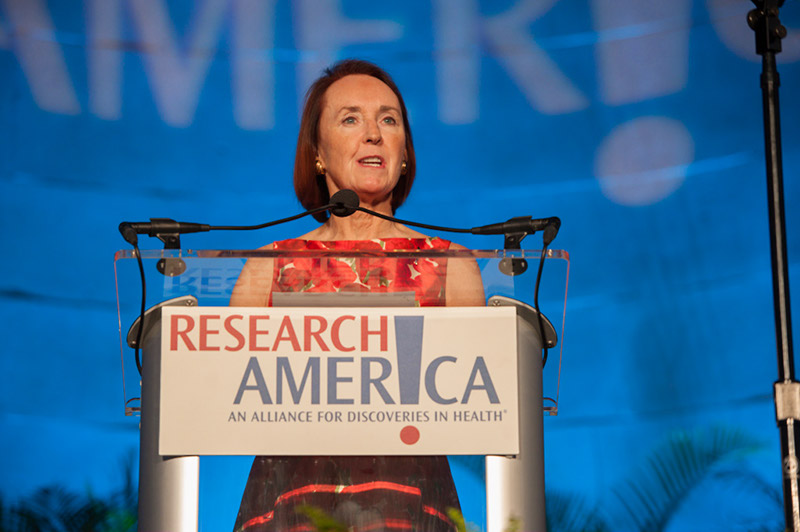Build Trust, Build Preparedness

Dear Research Advocate,
As anti-vaccine and anti-science rhetoric grows stronger and more toxic, it’s important not to shrink from stepping up to the threat it poses. As Dr. Peter Hotez observed in a powerful editorial last week (well worth the read, for many reasons), “Our scientific training did not include instructions for public engagement or navigating communications in a complex web of disinformation coming from multiple sources.”
Dr. Hotez doesn’t let the science community off the hook on communicating though, saying: “we have the knowledge, intellectual heft, and humanitarian obligation” to develop effective ways to communicate science. He gives suggestions on how to meet the moment now, as well as how to address root causes so we are better prepared going forward.
Also on Public Trust: The Associated Press reported yesterday on highlights of a general population survey on confidence in institutions, conducted by NORC at the University of Chicago since 1972. The percentage of the public who express a great deal of confidence in the scientific community has remained steady at about 50% for at least two decades (a very positive finding). However, what’s new and striking is the rapidly deepening partisan divide on trust in the scientific community, and an indication of a similar divide emerging for medicine. The researchers did not see similar partisan changes in confidence for other societal institutions. Stay tuned; we will continue to discuss public trust in science on a regular basis.
Strengthening Scientific Integrity: Lapses in scientific integrity can undermine public trust. OSTP deputy directors Alondra Nelson and Jane Lubchenco make this and other points in an editorial in Science that offers context for the newly proposed principles for scientific integrity and evidence-based practices included in the OSTP report on Protecting Integrity in Government Science.
On the Hill: Clear communication is a major factor in public trust; taking steps to assure we communicate effectively in emergencies is one of many imperatives in preparing for future pandemics. And prepare we must. We applaud Senate HELP Committee Chairwoman Patty Murray (D-WA) and Ranking Member Richard Burr (R-NC) for introducing the bipartisan PREVENT Pandemics Act draft bill (read our statement). We encourage you to share your feedback with the Committee (due February 4) and to thank Congress for working across the aisle to prioritize preparation for future health threats.
Next week, Congress’ most pressing issue will be to complete a FY22 omnibus appropriations bill. The continuing resolution flat-funding the FY21 budget expires February 18. We invite you to join a AAAS-led organizational sign-on letter to appropriators, stressing the importance of passing FY22 omnibus funding to advance important R&D and public health priorities and help the nation maintain its role as a global leader in science and technology. The deadline to sign onis Tuesday, February 1.
On Tuesday, the House released the America COMPETES Act of 2022 (H.R.4521), a much-awaited response to the Senate’s United States Innovation and Competition Act (S.1260), which passed with bipartisan support in June. Both bills authorize major new investments in federal science, technology, and innovation initiatives to assist the U.S. in maintaining its competitive edge. Quick action by the House would enable lawmakers from both chambers to reach a final agreement on the package and send it to the President.
Hear From Honorees: On Tuesday, February 1, noon – 1 pm ET, Johnson & Johnson’s Eureka Moments YouTube series will showcase two of Research!America’s 2022 honorees for the Outstanding Achievement in Public Health Awards, generously supported by Johnson & Johnson. Mark your calendars and tune in to watch the conversation with Bill Novelli and Matt Myers on the mission and future of the Campaign for Tobacco-Free Kids.
Obesity Briefing Recap: If you missed last week’s briefing, A Path to Progress: Perspectives, on Obesity Research and Treatment, read our write-up of the event and watch the recording. Panelists discussed such topics as the challenges faced by communities of color and the need for de-stigmatization when treating people living with obesity. Additionally, panelist Diane Ty, Director of the Portion Balance Coalition at Georgetown University, discussed the Eat for You campaign, which offers tools and educational resources to talk about eating habits and portion sizes.
Alliance Meeting Recap: This week we held a members-only conversation with Michael Lauer, MD, Deputy Director for Extramural Research at NIH. During this hour-long Q&A session, Dr. Lauer covered topics ranging from research security and integrity to pandemic flexibility to grant success rates.
If your organization is not a member of Research!America, join our alliance to be part of candid discussions like this one and help increase federal funding for life-saving research. Contact Anna Platt to learn more and sign on!
Upcoming Alliance Member Meeting: Join us on Thursday, February 3, at 11:30 a.m. for a chat with Stefano Bertuzzi, PhD, MPH, CEO of the American Society for Microbiology, as he discusses COVID-19 testing, gain of function (a term that is itself debated) research, and improving pandemic preparedness.
Stay well, stay safe, and stay connected.
Mary Woolley




